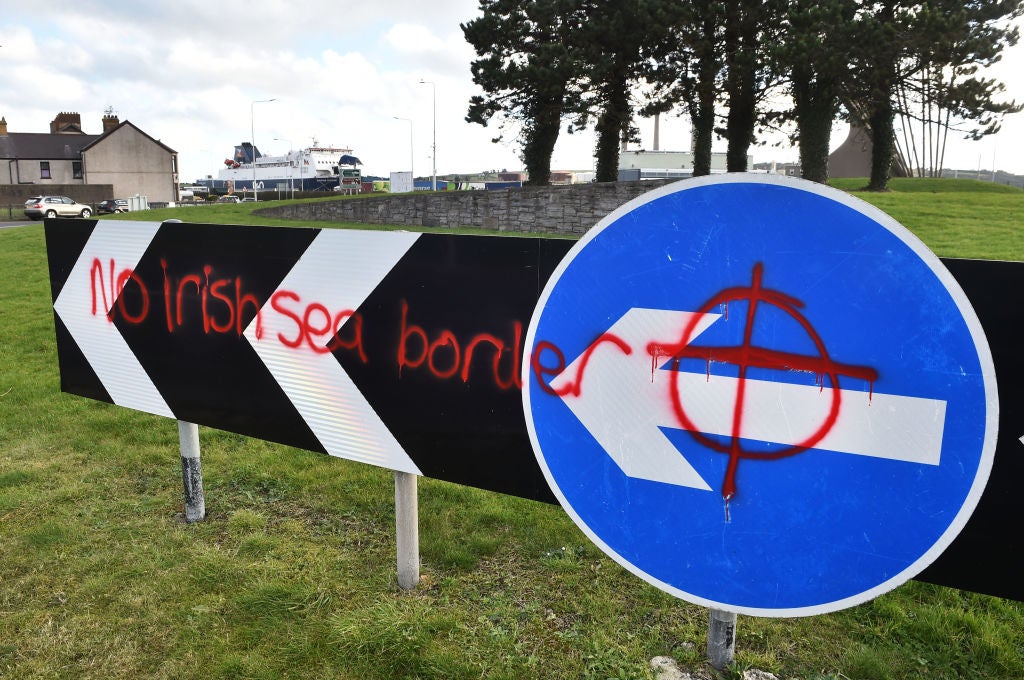Loyalist paramilitaries remove support for Northern Ireland’s historic peace deal
Belfast agreement brought to an end three decades of violence

Your support helps us to tell the story
From reproductive rights to climate change to Big Tech, The Independent is on the ground when the story is developing. Whether it's investigating the financials of Elon Musk's pro-Trump PAC or producing our latest documentary, 'The A Word', which shines a light on the American women fighting for reproductive rights, we know how important it is to parse out the facts from the messaging.
At such a critical moment in US history, we need reporters on the ground. Your donation allows us to keep sending journalists to speak to both sides of the story.
The Independent is trusted by Americans across the entire political spectrum. And unlike many other quality news outlets, we choose not to lock Americans out of our reporting and analysis with paywalls. We believe quality journalism should be available to everyone, paid for by those who can afford it.
Your support makes all the difference.Loyalist paramilitaries have said they are temporarily withdrawing their support from Northern Ireland's historic peace deal in protest at Brexit's Irish Sea border.
The Loyalist Communities Council (LCC), which represents the views of outlawed groups including the UVF, UDA and Red Hand Commandos, has written to Boris Johnson informing him of the decision and called on him to scrap the NI protocol.
The 1998 Good Friday accord brought to an end three decades of violence between republican and loyalist paramilitaries in NI and underpins the region's fragile power-sharing government.
Loyalists say the protocol has driven an economic wedge between the two and threatens NI's constitutional place within the UK.
The LCC letter, written by its chairman David Campbell, said the terms under which loyalist paramilitaries agreed to bring violence to an end has been undermined by NI's post-Brexit trading arrangements.
The letter to Mr Johnson says: "The protocol gives effect to the Irish nationalist position at the expense of the unionist position. This renders it in variance with the Agreement it purports to uphold and undermines the basis on which the Combined Loyalist Military Command (CLMC) agreed their 1994 ceasefire and subsequent support for the Belfast Agreement.
"The LCC leadership is determined that unionist opposition to the protocol should be peaceful and democratic. However, please do not underestimate the strength of feeling on this issue right across the unionist family."
Mr Campbell said he had also been instructed to write to Irish premier Micheal Martin.
The DUP and other unionist parties are pushing for the protocol to be axed, claiming it has driven an economic wedge between the region and Great Britain, thereby undermining the union.
NI's three pro-remain parties – Sinn Fein, the Alliance Party and the Social Democratic and Labour Party – are in favour of keeping the protocol.
They have accused unionist parties of failing to find workable solutions to some of the trade issues presented by the protocol. But unionists argue that it must be replaced.
On Wednesday the UK government took unilateral action to extend a grace period that has been limiting the volume of red tape associated with moving agri-food goods from GB into NI.
The EU has criticised the government move to extend the exemption period, which was due to run out at the end of the month, until October, claiming it risked breaching the terms of the protocol.
Ireland's Europe minister Thomas Byrne criticised the move, suggesting it could have been illegal and treads on "very dangerous water".
He told Radio 4's Today programme: "I think the British government has taken a unilateral action. What I've said before – whether its unilateral action by the British government of the EU - unilateral actions where NI is concerned are extremely risky, to say the least".
And Irish foreign minister Simon Coveney has said the EU cannot trust the UK as a negotiating partner.
Alliance Party deputy leader and North Down MP Stephen Farry said his party supported the extension of grade periods but also warned against "unilateral" action.
Additional reporting by Press Association



Join our commenting forum
Join thought-provoking conversations, follow other Independent readers and see their replies
Comments